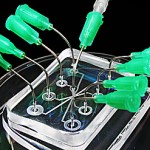 Mobile healthcare is certainly one of the more interesting aspects of the surge in innovation on mobile devices in recent years. At the heart of this innovation has been the Tricorder X Prize, which represents the latest in a long line of X Prize branded competitions aiming to provide breakthrough innovations.
Mobile healthcare is certainly one of the more interesting aspects of the surge in innovation on mobile devices in recent years. At the heart of this innovation has been the Tricorder X Prize, which represents the latest in a long line of X Prize branded competitions aiming to provide breakthrough innovations.
The target this time however is in the field of mobile healthcare. The $10 million prize asks competitors to accurately diagnose 15 diseases in 30 patients across 3 days using nothing but a mobile device. A new device, developed by researchers at Michigan Technical University, is not part of the Tricorder event, but nevertheless promises to make a big impact.
Traditionally, when you get sick, your doctor may take a sample of your blood and send it off to a lab for testing. That can often take some time to return results, which is both expensive and inefficient. The new device promises to change all of that.
The device provides a mobile laboratory that is the size of a credit card, and can offer people the opportunity to conduct blood tests wherever they may be. Such a facility would provide results to users within minutes, thus making it more cost effective as well as more efficient. It can also be used remotely.
The researchers are at pains to point out that these devices are in a very nascent stage, and are therefore developing quickly. Traditionally the devices would only be able to run one or two tests because they were often designed manually. The researchers believe a computer aided design approach could produce a device that can run dozens of tests with a single drop of blood.
“In a very short time, you could test for many conditions,” they say. “This really would be an entire lab on a chip.”
The researchers believe they have taken the first step down this road.
“We have developed software to design the hardware,” they say. Their work focuses on routing the droplet of blood or other fluid through each test on the chip efficiently while avoiding any chip contamination.
“It has taken us four years to do the software, but to manufacture the LOC would be inexpensive,” they continue. “The materials are very cheap, and the results are more accurate than a conventional lab’s.”
The aim is to eventually fabricate their own biochip using the software program they have developed. Interesting stuff indeed.
Science is cool 🙂